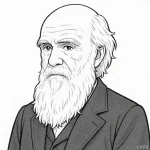“Just as we might take Darwin as an example of the normal extraverted thinking type, the normal introverted thinking type could be represented by Kant. The one speaks with facts, the other relies on the subjective factor. Darwin ranges over the wide field of objective reality, Kant restricts himself to a critique of knowledge.”

- July 26, 1875 – June 6, 1961
- Born in Switzerland
- Psychiatrist and psychologist
table of contents
Quote
“Just as we might take Darwin as an example of the normal extraverted thinking type, the normal introverted thinking type could be represented by Kant. The one speaks with facts, the other relies on the subjective factor. Darwin ranges over the wide field of objective reality, Kant restricts himself to a critique of knowledge.”
Explanation
In this quote, Carl Jung contrasts two distinct intellectual personalities or cognitive styles using Charles Darwin and Immanuel Kant as representative examples of different types of thinking. Jung links Darwin to the extraverted thinking type, emphasizing how Darwin’s approach to science was grounded in objective reality, facts, and empirical observation—hallmarks of the extraverted thinking function, which focuses on the external world and objective truths. In contrast, Jung associates Kant with the introverted thinking type, highlighting Kant’s focus on the subjective nature of human knowledge. Kant, according to Jung, was more concerned with the limits and structures of human understanding, focusing on how our minds shape and constrain our perception of reality, rather than on objective facts. For Jung, these differences exemplify the two types of thinking in his psychological typology: extraverted thinking (focused on the outer world) and introverted thinking (focused on the inner world).
This distinction reflects Jung’s broader theory of personality types, where he categorized people based on their preferred modes of perception and judgment. The extraverted thinking type, like Darwin, seeks to make sense of the world through empirical data and objective analysis, whereas the introverted thinking type, like Kant, seeks understanding through internal reflection and an exploration of subjective experience. Historically, both Darwin and Kant were pioneering thinkers in their respective fields, and their approaches demonstrate how different intellectual temperaments can lead to groundbreaking ideas in philosophy and science. While Darwin expanded our understanding of the natural world through observation and theory, Kant shifted the focus of philosophy toward the epistemological question of how we know what we know.
In modern terms, Jung’s differentiation can be applied to various fields of inquiry, from science to philosophy to psychology. For example, the scientific method often prioritizes objective data collection and analysis, echoing Darwin’s emphasis on external facts. Meanwhile, fields like psychology, particularly humanistic or constructivist psychology, often emphasize the importance of subjective experience and interpretation, akin to Kant’s focus on the limits of human cognition. Jung’s typology reminds us that different ways of thinking contribute to the richness of human understanding, whether it’s through the lens of objective reality or subjective reflection. Understanding these differences can also help us appreciate the variety of perspectives in problem-solving, innovation, and theoretical development.
Would you like to share your impressions or related stories about this quote in the comments section?


